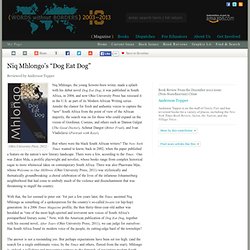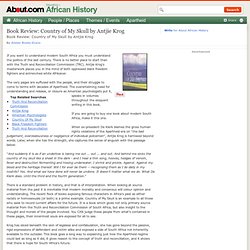

Incongruent experiences : literary representations of post-Apartheid Johannesburg in Ivan Vladislavić’s Portrait with keys. Niq Mhlongo’s “Dog Eat Dog” Reviewed by Anderson Tepper Ohio University Press, 2012 Niq Mhlongo, the young Soweto-born writer, made a splash with his debut novel Dog Eat Dog; it was published in South Africa, in 2004, and now Ohio University Press has reissued it in the U.S. as part of its Modern African Writing series.

Amidst the clamor for fresh and authentic voices to capture the “new” South Africa from the point of view of the African majority, the search was on for those who could expand on the vision of Gordimer, Coetzee, and others such as Damon Galgut (The Good Doctor), Achmat Dangor (Bitter Fruit), and Ivan Vladislavic (Portrait with Keys). But where were the black South African writers? The New York Times wanted to know, back in 2002, when the paper published a feature on the nation’s new literary landscape. With that, the list seemed to peter out. The answer is not a resounding yes. What gives Dog Eat Dog its real poignancy, however, is the historical backdrop. Copyright 2012 Anderson Tepper. Ohio University English Department. The New Black Literature in South Africa. The 2013 South African Literary Award (SALA) Winners.
Gillian Slovo. Her later work in particular has been a means of exploring, both directly and obliquely, the history of her parents' involvement in anti-apartheid activism in South Africa, and of acknowledging the effects of that involvement on their children.

Her unique insight into the complex interweaving of personal with public has made her a poignant, if sometimes cynical, commentator on the slow, traumatic processes of liberation and reform. Perhaps not surprisingly, given the levels of political intrigue which surrounded her as a child growing up in South Africa, Slovo's initial literary departures were through the thriller. Several early novels, including her first, Morbid Symptoms (1984), feature the character of Kate Baeier, the journalist turned private investigator whose cold but committed personality is perfectly adapted to the crime genre. Though formulaic, these are nonetheless stylish novels which update with skill and economy the influence of writers such as Raymond Chandler. Book Review: Country of My Skull by Antjie Krog. If you want to understand modern South Africa you must understand the politics of the last century.

There is no better place to start than with the Truth and Reconciliation Commission (TRC). Antjie Krog's masterwork places you in the mind of both oppressed black freedom fighters and entrenched white Afrikaner. The very pages are suffused with the people, and their struggle to come to terms with decades of Apartheid. The overwhelming need for understanding and release, or closure as American psychologists put it, speaks in volumes throughout the eloquent writing in this book. If you are going to buy one book about modern South Africa, make it this one.
When ex-president De Klerk blames the gross human rights violations of the Apartheid era on "the bad judgement, overzealousness or negligence of individual policemen", Antjie Krog is harrowed beyond words. "And suddenly it is as if an undertow is taking me out ... out ... and out. A History of South African Literature, timeline1824-2005. The Glasgow Missionary Society founded the school of Lovedale at Alice in the Tyume valley in 1824.

The first biography ever written about a black South African was published. It was written by John A. Chalmers on Rev Tiyo Soga. With the colonisation of South Africa came the emergence of 'The colonial adventure' writer. These colonial writers were unsettled and intrigued by what they perceived to be exotic elements of indigenous cultures. Olive Schreiner's novel, The Story of an African Farm (1883) was published.
The first Black-owned and Black-run journal, Tengo Jabavu's Imvo Zabantsundu, was founded. Douglas Blackburn's Prinsloo of Prinsloosdorp was published. Schreiner's Trooper Peter Halkett of Mashonaland was published, it included a critique of Cecil John Rhodes's brutal form of colonialism. Douglas Blackburn's A Burgher Quixote (1903) was published it was his 2nd novel satirising boere corruption. Douglas Blackburn's novel Leaven is published. 14th July. 19th July.